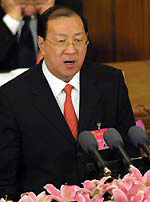|
 |
|
Finance Minister Jin Renqing delivers a report at the plenary
meeting of the NPC.(Newsphoto) |
Finance Minister Jin Renqing and the nation's taxation chief Xie
Xuren should expect to be deluged with questions on reforming China's
taxation system when they go before a press conference set for this
afternoon.
The questions will represent a continuation of a
nationwide debate on the reforms that have gone on for years. The debate
has grown louder in 2004 when financial authorities pushed hard for the
adoption of a unified
corporate income tax, which
would mean higher rates for foreign-funded enterprises.
The debate did not generate results last year.
So it is just natural that tax reform is among the hottest of topics
during the ongoing session of the National People's Congress (NPC) and the
Chinese People's Political Consultative Conference (CPPCC).
Dozens of formal proposals and speeches have been
centring on the topic. In addition to reforming the corporate income tax
system, NPC deputies and CPPCC members have urged a more just personal tax
system to be established, along with the enactment
of a Taxation Code, in effect a
basic law for taxation.
China's tax collectors now follow the 1991 Foreign-funded Enterprise
and Foreign Enterprise Corporate Income Law, which stipulates a 15 per
cent rate for such firms, and the 1993 Provisional Rules on Corporate
Income Tax, which set a 33 per cent rate for enterprises funded wholly by
domestic investors.
"The difference unfairly put domestic enterprises at a disadvantageous
position in competing with foreign peers," said Xu Yulin, a CPPCC member
and deputy director of the State Council's Legal Office.
In addition, tax experts said in an era when tax reductions are the
trend, the 33 per cent should also be cut.
Xu said relevant departments have drafted a plan for unifying policy,
with a single rate of around 25 per cent. That rate is at the middle-range
among rates adopted by other countries.
The plan also proposes a transition period of between two or three
years to help foreign-funded firms adjust to the new taxation level.
However, the plan has met with strong opposition from those who say a
unified rate will dampen foreign investment growth. They worry that China
will become less competitive when many Asian neighbours are trying harder
to attract overseas investors.
(China Daily) | 